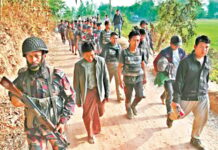AS PART OF OUR ONGOING SERIES OF INTERVIEWS OF POLITICAL PARTY LEADERS, TODAY WE ARE RUNNING THE INTERVIEW OF PRESIDENT OF OIKYA NAP PANKAJ BHATTACHARYA.

Pankaj Bhattacharya is one of the few veteran left-wing idealistic politicians in Bangladesh. He spent his entire life holding on to his ideologies, which he has never compromised with. This politician is the president of Oikya NAP.
Pankaj, who has been through many ups and downs, movements and struggles in his long political career, talked to The Daily Star recently. The 81-year-old touched upon a wide range of issues, like the spirit of the Liberation War, current situation of political parties including the party in power and the quality of pre- and post-71 elections.
The Daily Star (DS): We would like to get the current political situation from your perspective.
Pankaj Bhattacharya (PB): The politics of welfare for people, to improve the condition of their lives and to create a society free from exploitation suddenly disappeared.
DS: What do you mean by suddenly disappeared?
But why the changes made during the journey backwards still be even there? This is what I mean by ‘sudden’. It was not supposed to be. Bangabandhu’s Bangladesh, the independent Bangladesh is non-communal and humane. Why is that Bangladesh stumbling again and again?
My concern is the people-oriented politics that we did and that had been going on suddenly went off track. I have seen elections during the Pakistan period, still see elections now. The current election is an election without the involvement of the people.
If someone jokes that it is a state election, it is very difficult to refute with logic. I wonder why the country will run in the style of non-people democracy. It is here where we have strayed from the path of Bangabandhu.
DS: Is the mooted idea of “development or democracy” an inner essence of that deviated path?
PB: Development and democracy are two sides of the same coin. They are not contradictory. Development without democracy is temporary, the foundation is weak. Bangabandhu’s motto was that the constitution will be the guiding principle for the executive branch, the judiciary, and parliament to run the country. But we are not walking that path now.
DS: Voter-less election applies to military dictatorships as they do not have a public base. But the Awami League is a party that has a mass base. They are the biggest political party. So, what is the logic behind considering them isolated from the people?
PB: It is unfortunate that a true opposition political party with the spirit of the Liberation War has disappeared. The BNP is largely responsible for that. It is still a big question whether the Jamaat-loyal BNP can carry out that responsibility. If they do not resolve this, it is difficult to say whether the BNP will exist in future.
DS: The BNP won only six seats in the last parliamentary elections.
PB: The big question is whether that election was held. I saw the election in 1970, I am still observing. I have not seen such spineless and obedient Election Commission like the current one, not even in 1970.
DS: You are talking about the BNP. But there were times people thought the leftist parties will emerge as the third political force in the country. Why did they fail?
PB: They are only to be blamed for that. They must find out why they failed to get the people on board. They will be successful only when they will be able to bring the non-communal forces closer in the spirit of the Liberation War and create an alternative. Otherwise, I do not see any possibility of success.
DS: Why do you think the Awami League is isolated from the people?
PB: The Awami League is working a lot like a military government. The grassroots power of the Awami League is not being utilised. They are running the country with the support of the administration.
DS: This Awami League has repealed the indemnity act, tried the killers of Bangabandhu. The party has also tried and punished the war criminals. Why have they failed to keep up the good work?
PB: These are definitely major successes of the Awami League. The trial of the killers of Bangabandhu was barred by the indemnity act. To repeal the act and then bringing the killers to justice is an historic event for the nation. They are failing to keep up the good work because bureaucracy is now controlling politics. The political exercise based on people’s desire and fine-tuned through debate in parliament involving the ruling party and the opposition is currently absent.
DS: The Awami League is saying that the country is moving forward, development is on-going, the country’s financial condition is improving, and they are equipped to take on any challenges.
PB: It is a fact. Considering the condition 20 years ago, our economy has grown and many development activities have taken place. But if we want a sustainable development, we need cohesion between the three pillars of the state, we need accountability. It is only then the benefits of the development can reach the grassroots.
DS: The Awami League leaders, including it general secretary, are repeatedly saying that our healthcare system is of international standard.
PB: The healthcare system is so good that our president, ministers, members of parliament, and affluent people need to go outside the country for treatment. It is very unfortunate. We need to think from a neutral’s perspective. Addressing a problem does not mean criticising the Awami League. Not only that, our education system might collapse in future, and the symptoms are there. It is a national crisis. It is not wise to say everything is all right. It is about time to do something.
Log on to www.thedailystar.net for the full interview.









